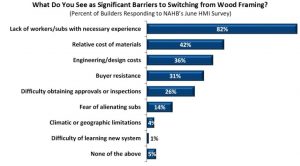NAHB: Why Builders Stick with Lumber Despite Price Hikes and Shortages

With builders grappling with record-high lumber prices and supply shortages over the past year, why are so few willing to switch away from traditional wood framing methods?
A June 2021 survey for the NAHB/Wells Fargo Housing Market Index (“HMI”) reveals several reasons, but one stands out above the rest.
More than four out of five builders (82%) cite a lack of workers and subcontractors with the necessary experience as a significant barrier to switching away from wood framing, which remains the dominant construction method for single-family homes in the United States, accounting for 91% of new homes completed in 2020. This would indicate that the typical framing crew is not ready to immediately start building homes out of concrete or steel.
After a lack of experienced workers, the No. 2 hurdle to switch from wood framing was the relative cost of materials, cited by 42% of builders. Not only have materials like steel and concrete tended to be more expensive than lumber historically, they have also recently been subject to their own shortages and price hikes.
The costs of re-designing and re-engineering homes to conform to a new construction method, buyer resistance, and difficulty obtaining inspections and approvals from local building departments were also each cited by more than 25% of home builders as significant barriers to switching away from traditional wood framing.
Only 5% of the builders indicated that none of the potential problems listed in the survey was a significant barrier.
Given all the reasons cited in the above chart, abandoning wood framing in favor of alternate construction methods doesn’t offer a quick, simple or easy solution to the problem of rising costs that are squeezing buyers with modest incomes out of the market for new homes.
NAHB senior economist Paul Emrath provides more analysis in this Eye on Housing blog post.
Source: National Association of Home Builders


